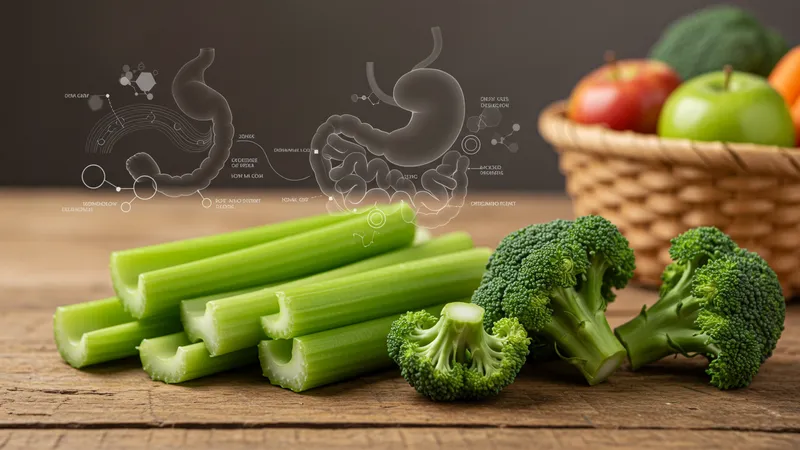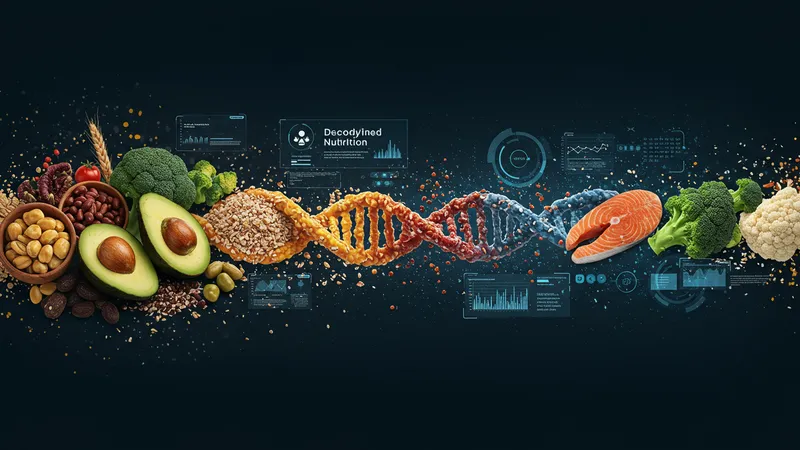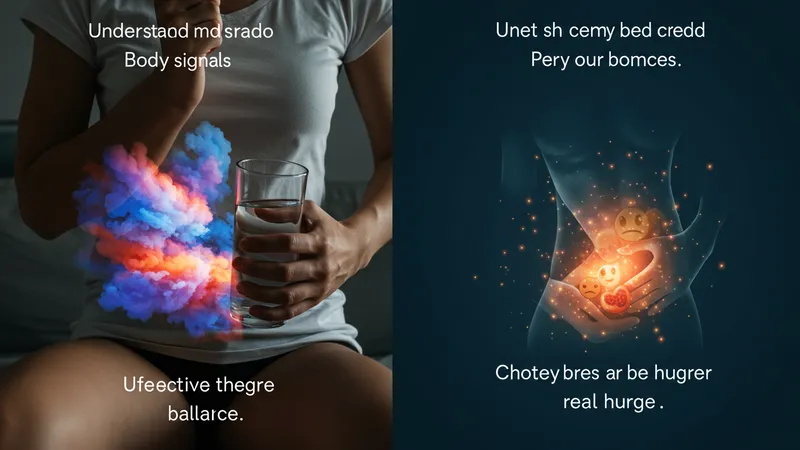Would you believe that one simple habit can double your weight loss efforts? Most people overlook it, but it could be the ultimate game-changer in your fitness journey. This secret’s out now, and you’ll soon discover why!
In today’s fast-paced lifestyle, shedding pounds has never been more critical. With health risks worsening and society’s pressure heightening, understanding weight loss is crucial. Are you ready to uncover what everyone’s been missing?

It turns out, the pivotal factor isn’t grueling gym schedules or bland diets— it's timing your meals. Surprised? Studies reveal that those who eat at specific intervals burn more calories effectively. But that’s not even the wildest part…
Did you know certain foods help in burning fat by themselves? Yes, seriously. These “negative-calorie” foods, like celery and grapefruit, consume more energy to digest than they provide. But before you toss your chips away, there’s more to the story…
The biggest shock to experts came when they discovered a little-known element that turns everything about weight loss on its head. Curious? This revelation challenges everything we thought we knew. What happens next shocked even the experts…
Many nutritionists emphasize not just what you eat, but when you eat it. The concept of "eating windows" has taken the diet world by storm, suggesting that constraining meal times can improve your body's ability to process food efficiently. It’s known as time-restricted eating, and it promises exceptional results. But there’s one more twist…

Imagine tapping into your body’s natural rhythm and boosting your metabolism by simply scheduling your meals. It might sound too good to be true, but proponents claim this method reduces fat storage by allowing your body to burn more efficiently during fasting periods. What makes it so intriguing is its ability to work without drastic diet changes.
Studies show that adopting an eating window can lead to significant weight loss without the need for calorie counting or exhaustive meal planning. The focus is on sync with your circadian rhythms, which naturally regulates energy levels and metabolism. But there’s a critical piece you can’t ignore…
While time-restricted eating sounds effortless, just narrowing your eating hours isn't the panacea. Success depends heavily on meal quality during your eating periods. Balancing nutritious meals with proper timings can exponentially enhance your results. What you read next might change how you see this forever.
You’ve likely heard that some foods require more energy to digest than they provide, but do they really exist? The truth about negative calorie foods is shrouded in myths and misunderstandings. It’s true: consuming certain raw vegetables and fruits can be a win-win, helping burn calories as they nourish. But the bigger picture holds more...

Negative calorie foods like celery and broccoli are low in calories yet high in fiber, forcing your digestive system into overdrive. This phenomenon prompts your body to use more energy than what the food itself delivers. But does this mean they’re the solution to weight loss?
Despite their benefits, relying solely on negative calorie foods isn't a silver bullet. They should complement a balanced diet rather than serve as substitutes for whole meals. Their biggest contribution? They can be a satisfying, low-calorie addition that might curb cravings and control appetite. But here’s where it gets complicated…
The maximal advantage of these foods is unleashed when combined with regular exercise and a varied diet plan. While fascinating, this method alone won’t lead to dramatic weight loss. The secret is in how you integrate them into a broader strategy that suits your lifestyle. And that, dear reader, is just skimming the surface.
From vibrating platforms to electric muscle stimulators, the market promises magical weight loss methods without breaking a sweat. These gadgets claim to tone muscles and incinerate calories with minimal effort. But how effective are they really? The answer might surprise you…
Though enticing, many exercise gadgets rely on exaggerated claims without scientific backing. The weight loss impacts are often negligible compared to traditional workouts. It turns out that despite marketing hype, consistency and hard work remain unparalleled.
However, not all tools are misleading. Some, like resistance bands and compact weights, can actually enhance home workouts with genuine health benefits. The key is selecting gadgets that complement, not replace, a well-rounded routine. Yet, one important detail often gets overlooked…
To see meaningful results, these tools should be part of a diversified exercise regimen. Relying solely on quick-fix machines won’t yield significant changes. Dive deeper into why sweat equity trumps convenience in the weight loss game.
Every other year welcomes a new diet craze, promising miraculous transformations. Keto, Paleo, and juice cleanses are household names, but how many deliver long-term success? It’s time to dig beneath the fad-diet layers and unveil the truth.

For starters, many diets promise rapid results but fail to maintain those changes. The underlying issue with fad diets is their unsustainable nature. Restrictive eating plans can often lead to nutrient deficiencies and rebound weight gain.
Despite their allure, most can't withstand the test of time. The real sustainable weight loss hero? A flexible diet that adapts to personal preferences and lifestyles, encouraging small, realistic changes rather than drastic measures.
The same goes for those magical “cleanse” programs. Temporary detox plans rarely contribute to lasting weight management. Explore the ins and outs of why lifestyle shakes up power over fads any day.
Here’s a fact: poor sleep can sabotage your weight loss efforts entirely. That’s right—undervalued sleep might be the culprit behind stubborn pounds. Research highlights a close link between quality rest and effective fat burning. Tempted to snooze your way to a slimmer you?

When you skimp on sleep, your hormones go haywire, sparking cravings and reducing impulse control. Inadequate rest influences ghrelin and leptin levels, hormones that regulate hunger and satiety. Catching more shut-eye can recalibrate these imbalances.
But insomnia alone isn’t the villain. Factors like sleep environment, bedtime routines, and stress influence sleep quality. A holistic approach encompassing all aspects can awaken the power of restorative rest in weight management.
Understanding this connection revolutionizes traditional weight loss narratives. From stress-busting rituals to sleep hygiene tips, discover the array of tools that pave the way for peaceful nights and productive days.
The stress-weight connection is more intertwined than you might think. Stress propels the release of cortisol, a hormone that can lead to weight gain by stimulating appetite and fat storage, especially around the abdomen. This hidden enemy might be thwarting your diet plans.

Circumventing stress-induced weight gain requires recognizing stressors and managing reactions. This process might involve mindfulness practices, such as meditation or yoga, which are proven to alleviate anxiety and improve coping mechanisms.
Stress can also impair digestion and metabolism, exacerbating weight issues despite your hardest efforts. Addressing emotional eating with cognitive behavioral strategies further reinforces health goals.
To tip the scales favorably, merging stress management with nutritional advice is essential. The meandering path of weight loss might finally become a straight road to success underbalanced holistic stewardship.
Could a glass of water be the weight loss trick you’ve overlooked? Drinking water before meals showed a remarkable impact on one’s ability to shed weight. Forget expensive pills; hydration might be your most underrated ally.

Water boosts metabolism and helps with fullness, reducing the likelihood of unnecessary snacking. Proper hydration also supports the body in efficiently breaking down fat molecules, aiding in effective weight management pathways.
Yet, quantity matters. The popular “eight glasses a day” mantra exists for a reason. However, hydration needs vary depending on physical exertion, climate, and personal composition. Knowing your optimal intake is vital.
Your next sip could reinvigorate your weight loss journey with a difference noticeable not just on scales, but your energy levels. Understanding the balance between hydration and hunger might just revolutionize your rituals.
Want to decode your genes to discover which diet works best for your body? Thanks to advancements in technology, personalized nutrition advises not generic diets, but those tailored to your genetic makeup for ultimate efficiency.

DNA testing companies now provide insights on how your body responds to carbs, fats, proteins, and exercise. This data informs a personalized approach rather than the one-size-fits-all mantra. It’s a nutrition revolution unfolding.
One of the key benefits includes minimizing trial-and-error phases for dieters, optimizing health outcomes from the get-go. However, skeptics argue it’s prematurely commercialized. The supporting evidence is still growing.
Nonetheless, with the right balance of skepticism and curiosity, utilizing genetic insights could soon become a staple in personalized weight loss strategies. Embrace this future-forward tool and unlock another dimension in understanding your dietary needs.
Have you ever noticed how your friend's diet excuses suddenly become your own? The ripple effect of our social networks significantly influences our health decisions. It’s all about the tribe we forge or fall into.

Surrounding yourself with like-minded individuals can boost accountability and morale. Studies confirm that we're more likely to achieve our health goals when supported by friends and family who share similar objectives.
However, the reverse is equally true. Peer pressure to indulge or skip workouts can derail progress. Managing social influences requires a cultivated awareness and sometimes, a rejig of your social engagements.
In learning how community perceptions shape our habits, understanding the invisible strings can allow us to retake control. The choices in your inner circle ultimately forge your path to or away from health success.
The fear of failure looms large in weight loss attempts, but what if embracing it was the strategy all along? Understanding setbacks as opportunities rather than endpoints revolutionizes mindset and approach.

Failures release valuable information about what doesn’t work for your body or lifestyle. Constant adaptation in response to these lessons forms the backbone of sustainable health journeys, paving the way for long-term success.
This mindset shift fosters resilience—a key trait of successful dieters. Instead of enforcing self-sabotage following an indulgence, recalibrating reinforces hope and direction. But how do you truly embrace this philosophy?
Delve into practical guidance on recognizing when to shift tactics or when to dig in your heels. The dynamic between failure and success can redefine your understanding and unlock latent determination. Trust, flexibility, and reflection are your allies.
Think you’re hungry? Think again. Understanding the body’s satiety and hunger signals can majorly affect your diet adherence and weight loss success. Many of us misinterpret thirst or emotional cues as hunger, leading to unnecessary eating.

Learning to differentiate between real hunger and emotional cravings is critical. Tuning into the body’s signals fosters intuitive eating practices, helping one consume when truly necessary rather than habitually logging calorie intake.
Satiety, influenced by meal composition, directly impacts fullness duration. Recognizing how macronutrient combinations affect you personally is vital. This knowledge empowers informed choices, enhancing dietary control.
Implementing strategies such as mindful eating encourages present consumption, assisting better digestion and satisfaction. Resonating with your body’s cues not only supports weight goals but fosters a holistic understanding of personal nutrition needs.
Incentivizing weight loss goals isn’t new, but what kind of rewards motivate the longest-lasting transformations? Many individuals overlook the power of non-food rewards in yielding success. Intrigued to know more?

Traditional food rewards can derail progress by reinforcing detrimental associations with food, returning you to old patterns. Non-food rewards, however, harness achievement without pitfalls—be it new gym gear, a spa day, or a hobby class.
Implementing strategic incentives can cultivate habit-forming or breaking across various milestones. Such rewards encourage a cycle of motivation and perseverance, essential to lifelong weight management success.
Uncover the secret behind this approach and how embedding it can revolutionize your routine. Reward innovation awaits those ready to embrace evolution in the weight loss narrative.
We’re surrounded by experts—professionals, influencers, trainers—all eager to impart their knowledge. But, is everyone in the health and fitness sphere giving sound advice, or does it harm more than help?

Digesting information requires critical assessment. Some advice fits all; others must be personalized based on individual needs. It's crucial to weigh these insights against personal experiences and explore alternative viewpoints.
In parsing through suggestions, identifying red flags—like extreme dieting or exercise promises—is imperative. Balanced perspectives from certified experts should guide, not dictate your wellness journey.
Applying these principles leads to balance—one that safeguards your health objectives and respects your body’s journey. This discerning approach clarifies which external counsel nurtures, and which confines. Discover the balance now.
As you stand at the precipice of transformation, the narrative of weight loss is more enriched and nuanced than ever. It synergizes diet, discipline, and discovery, unveiling an approach grounded not in drastic measures but thoughtful integration.

Your weight loss adventure, empowered by knowledge and bolstered by personalized practices learned through these pages, remains yours to command. Share this story, revisit these insights, and let them inspire your forward momentum.